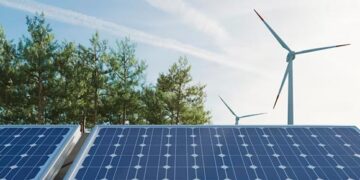Blitz Bureau
INDIA has achieved a landmark in its energy transition journey by reaching 50 per cent of its installed electricity capacity from non-fossil fuel sources – five years ahead of the target set under its Nationally Determined Contributions (NDCs) to the Paris Agreement.
This significant milestone underscores the country’s steadfast commitment to climate action and sustainable development, and signals that India’s clean energy transition is not only real but also accelerating, the statement said.
Union Minister of New and Renewable Energy Pralhad Joshi said, “In a world seeking climate solutions, India is showing the way. Achieving 50 per cent non-fossil fuel capacity five years ahead of the 2030 target is a proud moment for every Indian.
Prime Minister Narendra Modi’s leadership continues to drive Bharat’s green transformation – paving the path towards a self-reliant and sustainable future.” This achievement reflects the success of visionary policy design, bold implementation, and the country’s deep commitment to equity and climate responsibility. Flagship programmes such as PMKUSUM, PM Surya Ghar: Muft Bijli Yojana, solar park development, and the National Wind-Solar Hybrid Policy have laid a strong foundation for this transformation.
The bioenergy sector, which was once on the margins, has now become an important contributor to both rural livelihoods and clean energy generation, the Ministry of New and Renewable Energy said in a statement. India’s progress assumes greater significance in the global context. Despite having one of the lowest per capita emissions globally, India remains among the few G20 countries that are on track to meet – or even exceed – their NDC commitments.
At international platforms such as the G20 and the Conference of Parties (COP) to the United Nations Framework Convention on Climate Change, India has consistently advocated for climate equity, sustainable lifestyles, and low-carbon development pathways, the statement added.
By achieving the 50 per cent non-fossil milestone well ahead of schedule, India further reinforces its leadership as a clean energy frontrunner, demonstrating that economic growth and environmental stewardship can go hand


























